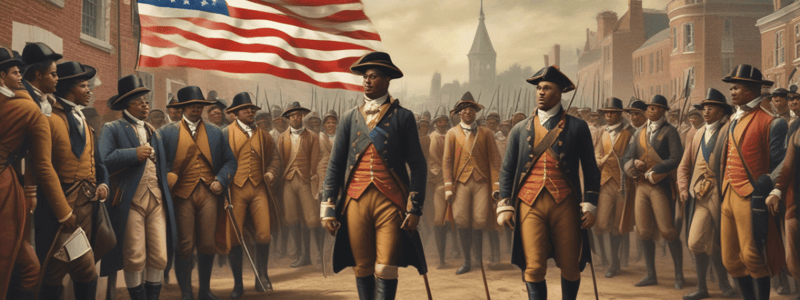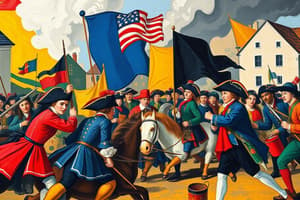Podcast
Questions and Answers
What was the main reason for the American colonists' growing frustration with Britain in the late 1760s?
What was the main reason for the American colonists' growing frustration with Britain in the late 1760s?
- The British government was not providing enough protection to the colonies.
- The British government was imposing taxes on the colonies without their consent. (correct)
- The British government was restricting trade with other countries.
- The colonists were not allowed to participate in the British government's decision-making process.
What was Crispus Attucks' occupation at one point?
What was Crispus Attucks' occupation at one point?
- Soldier
- Blacksmith
- Rope maker (correct)
- Teacher
Why did a group of colonists gather around a British sentry in March 1770?
Why did a group of colonists gather around a British sentry in March 1770?
- To protest the presence of British troops in Boston. (correct)
- To celebrate a British victory.
- To argue with the sentry over a personal matter.
- To defend the sentry from a young colonist.
What was Crispus Attucks' ancestry?
What was Crispus Attucks' ancestry?
What event did Crispus Attucks become a part of, ultimately leading to his death?
What event did Crispus Attucks become a part of, ultimately leading to his death?
What was the outcome of the trial of the soldiers who fired the shots during the Boston Massacre?
What was the outcome of the trial of the soldiers who fired the shots during the Boston Massacre?
How did the colonists view those who died in the Boston Massacre?
How did the colonists view those who died in the Boston Massacre?
What was special about Crispus Attucks' burial?
What was special about Crispus Attucks' burial?
What event is often seen as a direct consequence of the Boston Massacre?
What event is often seen as a direct consequence of the Boston Massacre?
How is Crispus Attucks often viewed in the context of the Revolutionary War?
How is Crispus Attucks often viewed in the context of the Revolutionary War?
Study Notes
American Revolution Background
- Late 1760s: American colonists grew tired of British rules and taxes, with no voice in their creation or implementation.
- Sugar Act and Stamp Act: Colonists were frustrated with taxes imposed by Britain.
- King George III: Continued to enact policies and laws that angered colonists further, leading to conflict.
Crispus Attucks
- Believed to be the son of a slave from Africa and a Native American mother.
- Crispus was a slave who desired freedom and escaped from his master.
- Worked in various jobs, including making ropes and as a sailor in Boston Harbor.
Boston Massacre
- 1770: Fight between local rope makers and British soldiers, followed by a conflict between a young colonist and a British sentry.
- Colonists crowded around the sentry, escalating anger led to throwing objects at British soldiers.
- British troops arrived, and one soldier fired shots, killing Crispus Attucks and four other colonists, and wounding six others.
Aftermath of the Boston Massacre
- Colonists revered those killed in the massacre as heroes.
- Laws prohibited black Americans from being buried in the same cemeteries as white Americans, but Crispus Attucks received a special burial.
- The acquitted soldiers who fired the shots further enraged colonists.
- Event marked the beginning of the American Revolution, with Crispus Attucks considered the first colonial casualty of the war.
- Colonists continued to show frustration with England through actions like the Boston Tea Party.
Studying That Suits You
Use AI to generate personalized quizzes and flashcards to suit your learning preferences.
Description
Learn about the events leading up to the American Revolution, including the Sugar and Stamp Acts, and the life of Crispus Attucks, a key figure in the fight for independence. Discover the motivations behind the colonists' desire for freedom and the role of King George III in the conflict.




